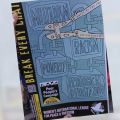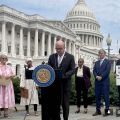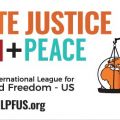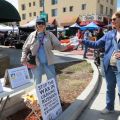July 2022
Housing Inequity and Homelessness: Can we Fix it?
Zoom Panel By An Economy of Our Own and Women, Money & Democracy Committee
Monday, July 25 at 8pm Eastern/7pm Central/5pm Pacific
Register here.
A home is more than just a dwelling. It’s the security a family feels having a roof over their heads that can’t be taken away. It’s the collective memories of a family gathering place. It can also be the equity that provides generational wealth. But increasingly in the U.S., owning a home is available only to the upper third of our citizens. Renting is being pushed as the go-to housing preference, even though it offers no equity and often little protection. What housing is available for the poor is in terrible condition, and after 3 years of pandemic economic losses, families are finding themselves on the edge of foreclosure while rates of homelessness climb.
House flippers, gentrification, profiteering off the poor, regulations that prevent new housing going up, and disappearing rights are all part of the problem. What are the solutions? In this Zoom of Our Own Conversation we’ll hear from an activist representing residents of a poverty-stricken trailer park in Fresno CA. We’ll hear about solutions like Community Land Trusts, and we’ll engage in a compelling and honest dialogue about how to fix the problem of inequitable housing in America. Join the conversation.
Let us know how you plan to commemorate the 77th Anniversaries of the bombings of Hiroshima and Nagasaki!
By Cherrill Spencer and Ellen Thomas
Co-chairs of DISARM/END WARS Issue Committee
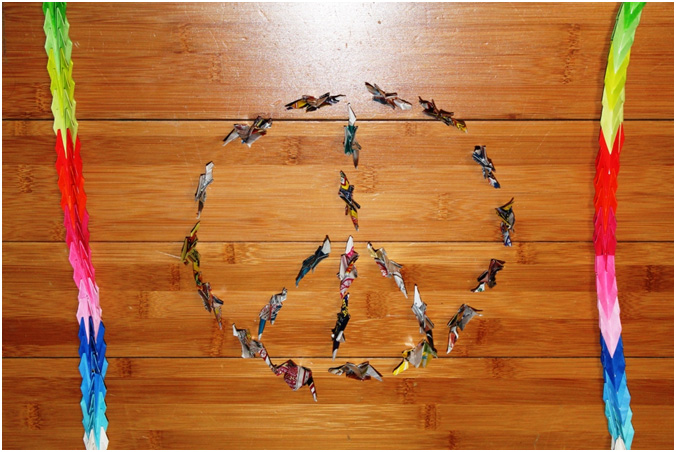 Every August, many WILPF branches hold events and activities to commemorate the annual anniversary of the atomic bombings of Hiroshima and Nagasaki in 1945. We hope many WILPFers will continue this tradition during August 6-9 this year, as a way of reminding ourselves why we work so hard to abolish nuclear weapons.
Every August, many WILPF branches hold events and activities to commemorate the annual anniversary of the atomic bombings of Hiroshima and Nagasaki in 1945. We hope many WILPFers will continue this tradition during August 6-9 this year, as a way of reminding ourselves why we work so hard to abolish nuclear weapons.
Photo: Peace cranes sent to WILPF from Japan arranged as a peace symbol. Photo by Samantha Britt, used with her permission.
The DISARM/End Wars Issue Committee invites representatives of WILPF branches to attend a zoom meeting on Sunday, July 31st, to tell us what your branch will be doing that week, and to plan for follow-on activities that will press for nuclear disarmament. The meeting starts at 4:30 pm PT, 6:30 pm CT, 7:30 pm ET.
The meeting link will be posted to the Disarm/End Wars Committee listserv; if you aren’t yet a list member, contact disarmchair@wilpfus.org to join the list or obtain the zoom link. And be sure to circulate the TPNW petition at your events!
Take Action to End Title 42!
by Tina Shelton
Advancing Human Rights Border and Migration Justice Subcommittee
The Border and Migration Justice Subcommittee asks that you and your people take action to end Title 42, a policy that was started under the former President and which imposed pandemic restrictions to block migrants from entering the United States.
You may have heard that Biden has taken steps to end Title 42 (finally!), but the process is currently stalled in court. Immigrant action groups believe that the best way to move forward is with legislation against Title 42, so that it cannot be resurrected.
Physicians for Human Rights have called Title 42 border expulsions “scientifically baseless and politically motivated”. Read more of their analysis and talking points here.
This video explains Title 42 in 60 seconds! Watch to learn more.
You can also find more background through this Guide to Title 42 Expulsions at the Border from the American Immigration Council.
Write directly to your elected officials using their contact forms on their websites, or use the link below to make your call in solidarity with the Black Alliance for Just Immigration, an organization keeping track of calls made on this issue.
Call your two senators: Fill out the information at this link, and follow the instructions to make the call through BAJI’s site (BAJI tracks the number of calls made in solidarity with their organization).
Use This Script: Hi. I'm from [ZIP] and, together with the Black Alliance for Just Immigration, I am calling on behalf of Black and brown migrants stranded at the border because of Title 42. As you know, this policy is inhumane, xenophobic, and un-American. Can I count on [NAME] to commit to bringing a legislative end to Title 42?
Advancing Human Rights Committee Accepting New Members
By Donna Pihl and Joan Goddard
Advancing Human Rights Issues Committee
Subcommittees of the national Advancing Human Rights Issues Committee are actively meeting and welcome new members! Currently active subcommittees are Border and Migration Justice, Ending Mass Incarceration and the Death Penalty (EMIDP), United Nations for Women (UN4 Women), and United Nations International Decade for People of African Descent (UN Decade/Reparations). Contact by writing to AHRchair@wilfus.org.
Starting Up the WILPF DC Branch
by George Friday and Theresa El-Amin
AHR Committee
On Friday, June 17 at 7:30pm, WILPF US members and supporters gathered for the restart of the DC Branch of WILPF US at the Sankofa Bookstore and Cafe, 2714 Georgia Avenue NW, Washington DC 20001.
Theresa El-Amin from the Fannie Lou Hamer Branch in Columbus, Georgia organized the event. Theresa printed the event programs and arranged for speakers. All expenses for the meeting were covered by the Southern Anti-Racism Network (SARN). The cost of the event was just over $500.
Luci Murphy, DC Branch organizer, secured the location, conducted outreach to current and potential new DC area Branch members, and served as event MC. Top WILPF US National officers President Darien De Lu, Treasurer Jan Corderman, and Secretary Dianne Blais welcomed the start of the new DC Branch. Several members from branches around the country who were in town for The Poor People’s Campaign events also brought greetings.
Over 30 people attended in a modest-sized space to sing together and hear updates about the organization.
 Vicki Elson provided updates about the TPNW, while Emily Keel, WILPF US Liaison to the Poor People’s Campaign, shared reminders about the Poor People's Campaign events throughout the weekend. Eileen Kurkoski from Boston was also in attendance.
Vicki Elson provided updates about the TPNW, while Emily Keel, WILPF US Liaison to the Poor People’s Campaign, shared reminders about the Poor People's Campaign events throughout the weekend. Eileen Kurkoski from Boston was also in attendance.
Upcoming Earth Democracy Panels at International Congress
by Nancy Price and Darien de Lu
Don’t miss the Earth Democracy Panels at the International Congress, July 16-22! Read more about these events after you have registered by logging in here. You can find more info about Earth Democracy panels in the eNews article..
Secure your ticket for the Congress at this link.
Towards Environmental Peace and Justice – A Space for Learning and Exchange
Monday, July 18
10:00 pm–11:30 pm CEST
4:00 pm–5:30 pm EDT
1:00 pm–2:30 pm PDT
Can Sanctions ever be just – let alone effective? A Feminist
Perspective, Patricia Hynes
Wednesday, July 20
7:00–8:30 pm CEST
1:00–2:30 pm EDT
10:00–11:30 am PDT
Climate Justice+Women+Peace, Cindy Piester and Nancy Price
Friday, July 22
6:00 – 7:30 pm CEST
12:00 – 1:30 pm EDT
9:00 – 10:30 am PDT

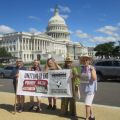
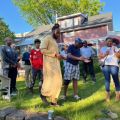

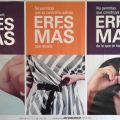
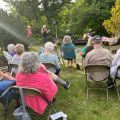
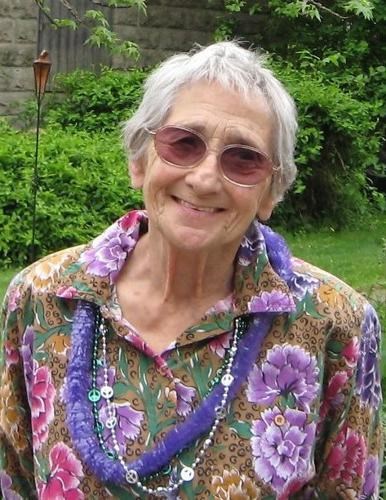 The death of Edith Bell on May 22, 2022, is a huge loss to WILPF and the activism community in Pittsburgh. During her time in the US, she started three WILPF branches – in Wisconsin, West Virginia, and finally Pittsburgh in 2002. In 2003, Edith co-founded the Pittsburgh Raging Grannies who sang (and sing) frequently at events, such as marches, the Occupy Movement, and sometimes on street corners. For years, Edith organized WILPF meetings, marches, made signs, and showed up at planning meetings and events of related organizations. She became an active and leading member of several groups including Stop Banking the Bomb, Black and White Reunion, Thomas Merton Center, and Remembering Hiroshima/Imagining Peace.
The death of Edith Bell on May 22, 2022, is a huge loss to WILPF and the activism community in Pittsburgh. During her time in the US, she started three WILPF branches – in Wisconsin, West Virginia, and finally Pittsburgh in 2002. In 2003, Edith co-founded the Pittsburgh Raging Grannies who sang (and sing) frequently at events, such as marches, the Occupy Movement, and sometimes on street corners. For years, Edith organized WILPF meetings, marches, made signs, and showed up at planning meetings and events of related organizations. She became an active and leading member of several groups including Stop Banking the Bomb, Black and White Reunion, Thomas Merton Center, and Remembering Hiroshima/Imagining Peace.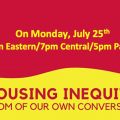
 Every August, many WILPF branches hold events and activities to commemorate the annual anniversary of the atomic bombings of Hiroshima and Nagasaki in 1945. We hope many WILPFers will continue this tradition during August 6-9 this year, as a way of reminding ourselves why we work so hard to abolish nuclear weapons.
Every August, many WILPF branches hold events and activities to commemorate the annual anniversary of the atomic bombings of Hiroshima and Nagasaki in 1945. We hope many WILPFers will continue this tradition during August 6-9 this year, as a way of reminding ourselves why we work so hard to abolish nuclear weapons.  Vicki Elson provided updates about the TPNW, while Emily Keel, WILPF US Liaison to the Poor People’s Campaign, shared reminders about the Poor People's Campaign events throughout the weekend. Eileen Kurkoski from Boston was also in attendance.
Vicki Elson provided updates about the TPNW, while Emily Keel, WILPF US Liaison to the Poor People’s Campaign, shared reminders about the Poor People's Campaign events throughout the weekend. Eileen Kurkoski from Boston was also in attendance.